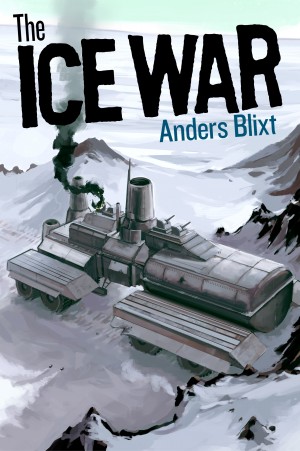Interview with Anders Blixt
Published 2015-01-20.
Do you remember the first story you ever wrote?
It was in third grade in 1968, a time when the Apollo Moon program was a major item the Swedish news. The teacher gave us the assignment to write a story about a trip and I wrote a piece in which I stowed away on the first moon lander. This was before Apollo 11 but after Apollo 8.
The first time I tried to write a novel was in 1973-74, when I wanted to do a pastiche on "Prisoner of Zenda". I penciled the story in the blue-covered notebooks that were common among school children in those days. No, I never finished the tale, but somewhere in a crate at home, the notebooks are still around together with a few handmade maps relating to the hero's adventure.
What is your writing process?
I look for a quiet place with a comfortable chair, make sure that I have some strong coffee available and then I start typing.
Do you remember the first story you ever read, and the impact it had on you?
I remember the first science fiction story I read: Jules Verne's "Twenty Thousand Leagues under the Sea" in a Swedish translation. I was eight years old in 1967 and my dad handed the book to me with the words "I enjoyed this when I was a kid". I loved the tale: exotic locales, fantastic machines and undersea monsters. I was particularly fascinated by the chapter in which the submarine Nautilus is trapped under the Antarctic ice and the protagonists are running out of air. That was when I fell in love with science fiction.
How do you approach cover design?
Graphic design is not my forte, so I consult with friends that are considerable more skilled in the field.
What are your favorite books, and why?
In fantasy: "Lord of the Rings" by JRR Tolkien. I read it for the first time in eighth grade. The drama, the pain, the feats and the beauty of Tolkien's world astonished me. The story is so rich that I can re-read time and time again and find now wonders to ponder.
In mainstream fiction: "My Name Is Asher Lev" by Chaim Potok. A novel about an outsider, an artist whose works are frowned upon by his community. Potok speaks about the necessity of being creative and what consequences that may have.
In science fiction: "Sands of Mars" by Arthur C Clarke. A story about the colonization of Mars and how it affects the protagonist, a middle-aged lone-wolf author who there finds himself a pack. The story is scientifically outdated, but its nucleus about human dreams and inner growth is still valid.
What do you read for pleasure?
Mainly science fiction or non-fiction dealing with history, astronomy and space research. I am particularly interested in the robotic exploration of Mars and the search for extra-terrestrial life.
What is your e-reading device of choice?
I use a Kindle because I got it as a birthday gift from my sisters.
Where did you grow up, and how did this influence your writing?
I grew up in the port city of Gothenburg in south-western Sweden in the 1960s and 1970s. Our house was located a kilometer from the sea, so many mornings the screeches of seagulls pulled me out of sleep. As a teenager I became fascinated by ships and ocean voyages, so I frequently walked along the quays to look at the merchantmen from distant ports. I also read much about the famous ocean explorers: James Cook, Roald Amundsen, Thor Heyerdahl, and so on.
Oceans, ships and port cities are therefore recurrent in whatever I write: the perfect venues for exotic adventures.
What's the story behind your latest book?
In the 1990s, I worked as a civilian expert in the logistic tail of Sweden's military contributions to the UN forces in the Balkans during the Bosnian war. I worked in a military base near Stockholm, preparing our men and women for what they would face "down there" and analyzing "lessons learned" from earlier peacekeeping operations.
In Bosnia there was often little peace to be kept; at some occasions our blue helmets saved the lives of civilians caught in the maelstrom of war and at others they failed. I write about what it was like to us entangled outsiders, but because I am a science fiction author I put my story in an alternate timeline, in which the modern world looks quite different.
What motivated you to become an indie author?
I spent the 00s receiving polite rejection slips from overburdened book publishers. I want my stories to be read and since I am no longer a young man, I cannot wait for years before getting accepted by a publisher. So now when the technology and logistics are available for indie authors, I decided to use it.
Smashwords Interviews are created by the profiled author or publisher.
Books by This Author
The Ice War
by Anders Blixt
(4.00 from 2 reviews)
The year is 1940 and in Central Europe, republicans revolt against the despotic Habsburg Empire. Rebel spy Johnny Bornewald flies to the icy continent of Alba to gather intelligence with local ally Linda Connor. The mission goes awry, the two stumble on a continent-wrecking scheme and must flee for the lives. Will their guile and skills save Alba's settlers from destruction?

